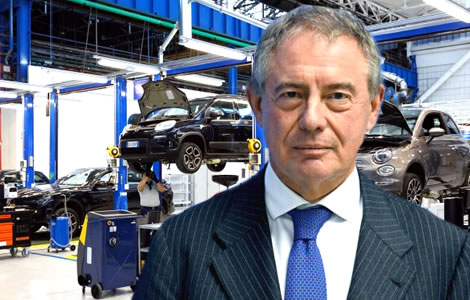Italy’s Industry Minister warns the EU’s Green Deal combustion engine ban threatens Europe’s automotive industry, risking mass job losses. Weak EV demand, costly vehicles, and dependence on China prompt urgent calls for policy revision.
Italy’s Industry Minister is sounding the alarm over the European Union’s Green Deal and the proposed ban on combustion engine cars. In short, the EV or electric car market in the bloc has almost collapsed this year. This mirrors trends worldwide as the consumer markets reject the EV car proposition. Nonetheless, the 27-member bloc’s ambitious climate action plan mandates that no new combustion engine cars be sold after 2035.

Rome, Italy – Italy’s Industry Minister, Adolfo Urso, has issued a stark warning about the European Union’s impending ban on new combustion engine cars, labelling it a “grave crisis” for European carmakers. He emphasised the need for a swift revision of the EU’s Green Deal policies to avoid large-scale job losses in the automotive sector.
Urso, a senior member of Prime Minister Giorgia Meloni’s Brothers of Italy party, highlighted the severe economic consequences the 2035 ban could have across Europe. “Hundreds of thousands of European car manufacturing jobs are at risk unless Brussels reconsiders its environmental targets,” Urso said in a recent interview.
Call for Urgent Review of Green Deal
The European Green Deal, a key part of the EU’s climate strategy, mandates that no new combustion engine vehicles can be sold after 2035.
This policy is part of the broader effort to reduce greenhouse gas emissions and combat climate change. However, Urso argues that the current road map is flawed and threatens Europe’s industrial base.
EV sector crisis as Chinese firms are trapped between lack of demand and government tax penalties
Top Thai insurer says no more new policies for EV cars. Later, it emphasised renewals case by case
“The data speaks for itself,” he said. “The collapse of the European electric vehicle market and the crisis faced by carmakers demonstrate the contradictions of this plan.”
Urso will take this message to Brussels during high-level meetings this week, pushing for an immediate review of the emissions rules. He is advocating for a delay to the 2035 deadline, and for broader allowances that include other clean technologies like biofuel and synthetic fuel vehicles.
Europe’s Automotive Industry Under Pressure
Urso’s warning comes as concerns grow among European carmakers and policymakers about the state of the continent’s car industry.
The rise of cheaper Chinese electric vehicle imports is further intensifying pressure on local manufacturers. This, combined with the upcoming ban, risks severely harming Europe’s automotive sector, which is a key driver of employment.
Italy’s largest carmaker, Stellantis, recently halted production at its Turin plant for a month due to weak demand for the electric version of its Fiat 500. The electric model, priced at €30,000, is significantly more expensive than the €17,700 hybrid alternative.
Meanwhile, Volkswagen, Germany’s biggest carmaker, has warned workers that its long-standing job guarantees may no longer be sustainable. An estimated 165,000 people are employed in Italy’s automotive industry, with 780,000 jobs in the sector in Germany.
Data from Italy’s National Auto Industry Supply Chain Association shows a grim picture. Car production in Italy dropped by more than a third in the first seven months of 2024. This is compared to the same period in 2023. While hybrid vehicle sales increased by 16 percent in the January-August period, electric vehicle sales declined by 12 percent.
The High Costs of Electric Vehicles
Urso pointed to the high costs of electric vehicles as a major issue. “Electric vehicles cost too much compared to the incomes of Europeans and Italians,” he said. This has created a barrier to widespread adoption. Moreover, Urso warns about Europe’s rush to embrace electric vehicles. He says failing to establish its own supply chains could leave the continent dependent on China for critical raw materials.
“The risk is that we move from dependence on Russian fossil fuels to dependence on raw materials produced or processed in China,” Urso added. He called for a strategy that ensures Europe’s “strategic autonomy,” especially in the face of global disruptions like pandemics or geopolitical conflicts.
Calls for Financial Support and Industry Alignment
While the EU is scheduled to review the combustion engine ban in 2026, Urso urged European Commission President Ursula von der Leyen to expedite this process. The industry minister warned that failure to act swiftly could result in widespread social unrest, similar to recent protests by European farmers against Green Deal regulations.
“Everyone is aware that if we don’t move quickly, in a few months, we won’t just see farmers with their tractors in Brussels and Strasbourg, but also workers,” Urso cautioned. He noted that this sentiment is already spreading across Europe, where anxiety over job losses is mounting.
Italy has already taken steps to mitigate the impact of the Green Deal, including spending nearly €1 billion this year on incentives to encourage consumers to switch to electric vehicles. However, the demand for these incentives has far outstripped supply, with funds exhausted within nine hours of the programme’s launch. “It’s just a drop in the ocean,” Urso said, calling for more substantial economic resources to support the transition.
Urso stressed the importance of aligning environmental policy with industrial policy. He reaffirmed Italy’s commitment to reducing emissions but insisted the process must be economically sustainable. “We agree with the transition towards electric vehicles as long as it’s sustainable,” Urso concluded.
The stakes are high
Nonetheless, the EU pushes forward with its ambitious Green Deal. The tension between environmental goals and economic realities is becoming increasingly clear. Italy’s call for a review of the 2035 combustion engine ban reflects broader concerns. Certainly, within Europe’s automotive industry about the feasibility of this transition.
At this time, car makers are struggling with falling electric vehicle sales and rising competition from China. Therefore, the need for a balanced approach that protects jobs while addressing climate goals is more pressing than ever.
Urso’s upcoming meetings in Brussels could signal a critical turning point. Undoubtedly, the debate is over the future of Europe’s car industry. Whether the EU will heed Italy’s warnings and adjust its Green Deal policies remains to be seen. However, the stakes — both economic and environmental — are high.
Join the Thai News forum, follow Thai Examiner on Facebook here
Receive all our stories as they come out on Telegram here
Follow Thai Examiner here
Further reading:
EV sector crisis as Chinese firms are trapped between lack of demand and government tax penalties
Thailand changes tack as EV revolution turns into a damp squib with warehouses full of unsold cars
Top Thai insurer says no more new policies for EV cars. Later, it emphasised renewals case by case
Lack of coherence in government policy is the root cause of Thailand’s massive economic problems
Disturbing questions that must be confronted over Thailand’s reeling economy are China and EV cars
First-quarter GDP growth surprises analysts based on higher tourism and consumer spending growth
Central bank holds interest rates. Economy will grow 2.6% in 2024 as Srettha pushes home ownership


















